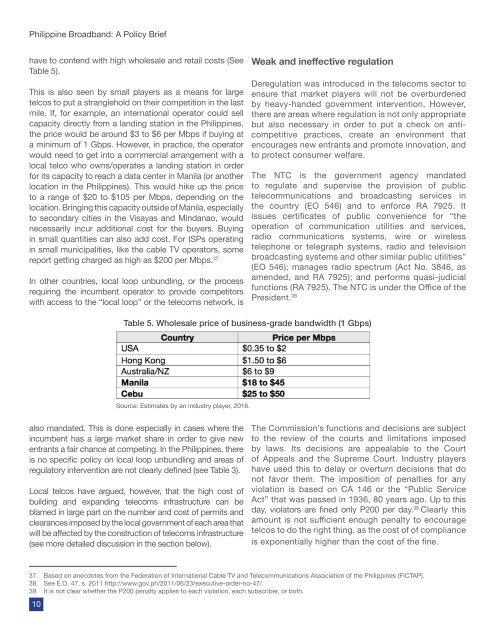Philippine Broadband A Policy Brief
ONLINE-BROADBAND-POLICY-BRIEF1
ONLINE-BROADBAND-POLICY-BRIEF1
You also want an ePaper? Increase the reach of your titles
YUMPU automatically turns print PDFs into web optimized ePapers that Google loves.
<strong>Philippine</strong> <strong>Broadband</strong>: A <strong>Policy</strong> <strong>Brief</strong><br />
have to contend with high wholesale and retail costs (See<br />
Table 5).<br />
This is also seen by small players as a means for large<br />
telcos to put a stranglehold on their competition in the last<br />
mile. If, for example, an international operator could sell<br />
capacity directly from a landing station in the <strong>Philippine</strong>s,<br />
the price would be around $3 to $6 per Mbps if buying at<br />
a minimum of 1 Gbps. However, in practice, the operator<br />
would need to get into a commercial arrangement with a<br />
local telco who owns/operates a landing station in order<br />
for its capacity to reach a data center in Manila (or another<br />
location in the <strong>Philippine</strong>s). This would hike up the price<br />
to a range of $20 to $105 per Mbps, depending on the<br />
location. Bringing this capacity outside of Manila, especially<br />
to secondary cities in the Visayas and Mindanao, would<br />
necessarily incur additional cost for the buyers. Buying<br />
in small quantities can also add cost. For ISPs operating<br />
in small municipalities, like the cable TV operators, some<br />
report getting charged as high as $200 per Mbps. 37<br />
In other countries, local loop unbundling, or the process<br />
requiring the incumbent operator to provide competitors<br />
with access to the “local loop” or the telecoms network, is<br />
Weak and ineffective regulation<br />
Deregulation was introduced in the telecoms sector to<br />
ensure that market players will not be overburdened<br />
by heavy-handed government intervention. However,<br />
there are areas where regulation is not only appropriate<br />
but also necessary in order to put a check on anticompetitive<br />
practices, create an environment that<br />
encourages new entrants and promote innovation, and<br />
to protect consumer welfare.<br />
The NTC is the government agency mandated<br />
to regulate and supervise the provision of public<br />
telecommunications and broadcasting services in<br />
the country (EO 546) and to enforce RA 7925. It<br />
issues certificates of public convenience for “the<br />
operation of communication utilities and services,<br />
radio communications systems, wire or wireless<br />
telephone or telegraph systems, radio and television<br />
broadcasting systems and other similar public utilities”<br />
(EO 546); manages radio spectrum (Act No. 3846, as<br />
amended, and RA 7925); and performs quasi-judicial<br />
functions (RA 7925). The NTC is under the Office of the<br />
President. 38<br />
Table 5. Wholesale price of business-grade bandwidth (1 Gbps)<br />
Source: Estimates by an industry player, 2016.<br />
also mandated. This is done especially in cases where the<br />
incumbent has a large market share in order to give new<br />
entrants a fair chance at competing. In the <strong>Philippine</strong>s, there<br />
is no specific policy on local loop unbundling and areas of<br />
regulatory intervention are not clearly defined (see Table 3).<br />
Local telcos have argued, however, that the high cost of<br />
building and expanding telecoms infrastructure can be<br />
blamed in large part on the number and cost of permits and<br />
clearances imposed by the local government of each area that<br />
will be affected by the construction of telecoms infrastructure<br />
(see more detailed discussion in the section below).<br />
The Commission’s functions and decisions are subject<br />
to the review of the courts and limitations imposed<br />
by laws. Its decisions are appealable to the Court<br />
of Appeals and the Supreme Court. Industry players<br />
have used this to delay or overturn decisions that do<br />
not favor them. The imposition of penalties for any<br />
violation is based on CA 146 or the “Public Service<br />
Act” that was passed in 1936, 80 years ago. Up to this<br />
day, violators are fined only P200 per day. 39 Clearly this<br />
amount is not sufficient enough penalty to encourage<br />
telcos to do the right thing, as the cost of of compliance<br />
is exponentially higher than the cost of the fine.<br />
37. Based on anecdotes from the Federation of International Cable TV and Telecommunications Association of the <strong>Philippine</strong>s (FICTAP).<br />
38. See E.O. 47, s. 2011 http://www.gov.ph/2011/06/23/executive-order-no-47/.<br />
39. It is not clear whether the P200 penalty applies to each violation, each subscriber, or both.<br />
10


